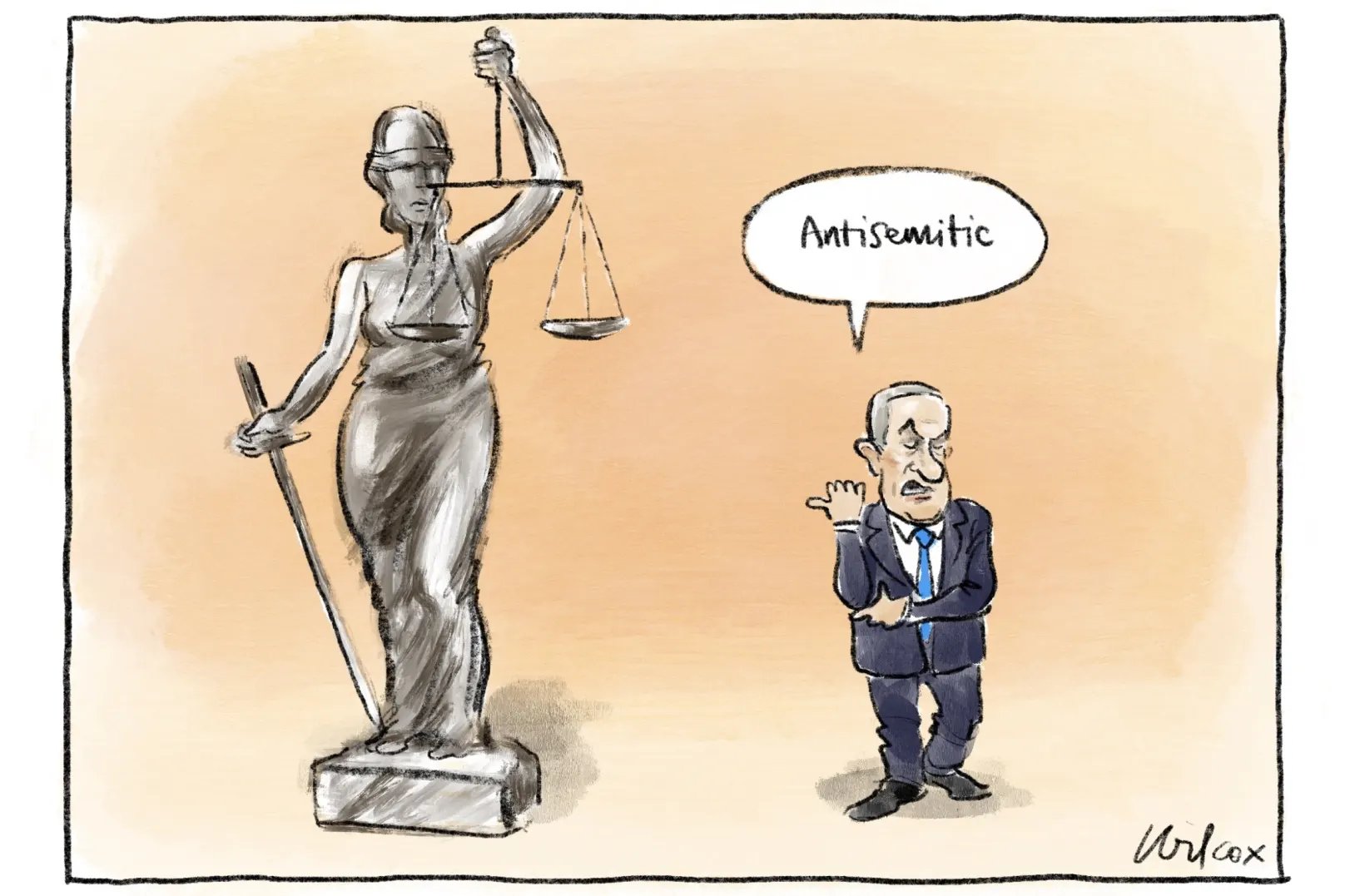
![]()
History repeats in the most chilling of ways
By Richard Hil
Dec 12, 2024

Earlier this month, the Sydney Morning Herald published a cartoon by the irrepressible Cathy Wilcox. I gazed at the image for a long time. My first thought was that she’ll pay a price for this, and so might the Herald. And, true to form, there was indeed a strong reaction in some quarters.
The cartoon depicted what looks like Athena, the Greek Goddess of justice holding a set of balanced scales next to the diminutive figure of Israeli Prime Minister, Benjamin Netanyahu. He’s looking askance, with a thumb pointing dismissively at Athena. His utterance? “Antisemitism”.
The obvious inference is that any criticism of Israel’s actions in respect of Gaza, the West Bank, Lebanon and so forth is, in the view of Netanyahu and his supporters, infused with a deep hatred of Jews. While most reasonable people would dismiss such nonsense, this crude correlation remains integral to Israel’s global marketing campaign, the main aim of which is to deflect criticism, push the self-defence narrative, and keep the money and armaments rolling in. It has another purpose: to gain the high moral ground and legitimate the continuing slaughter of countless innocents.
The accusation of antisemitism is the rhetorical equivalent of the Glasgow-kiss: short, sharp and effective. It terrifies some critics of Israel, thus achieving its strategic purpose by keeping them quiet. Reductivist notions of antisemitism have also been adopted by morally conflicted nations, most notably, the US, as well as by organisations like the International Holocaust Remembrance Association.
Astonishingly, a number of Australian universities have accepted the Association’s view that criticism of Israel = antisemitism, fearful perhaps of the consequences of not doing so. In institutions supposedly dedicated to critical thought and of holding truth to power, there can be no more egregious example of anti-intellectualism.
But this is the point of Wilcox’s artwork: it highlights how the smear of antisemitism plays a key strategic role in silencing criticism of Israel. There’s nothing new about this. It’s been going on for years, promoting Israel’s longstanding efforts to manufacture a narrative to justify its ongoing illegal and murderous actions against the Palestinians.
All of which brings me to the arrest warrants issued in late November by the International Criminal Court in respect of Netanyahu and former defence minister, Yoav Gallant. The warrants state that both Netanyahu and Gallant are: “…responsible for the war crimes of starvation as a method of warfare and of intentionally directing an attack against the civilian population; and the crimes against humanity of murder, persecution, and other inhumane acts from at least 8 October 2023 until at least 20 May 2024”.
Given various public statements by both of the accused, the prima facie case against them is strong. Netanyahu’s first response was to describe the charges and the ICC as “antisemitic”. Predictably, despite all the chatter about the rule of law, international law, etc, a gaggle of countries led by the US, have opposed the warrants. More principled nations have remained steadfast in their support of the ICC. As journalist Jonathan Cook notes, this is a decisive moment for the ICC as it seeks to hold the line on legal principle, while withstanding the onslaught against it.
However much Israel’s political leaders might huff and puff in response to numerous reports about Israel’s human rights abuses – Amnesty International’s ‘You Feel Like You Are Subhuman’: Israel’s Genocide Against Palestinians in Gaza provides the latest salvo – they cannot avoid the historical reckoning that is now taking place. Nor can they easily escape comparisons with murderous regimes that have sought to morally justify their actions against civilian populations.
Predictably, the comparison drawn between Gaza and the liquidation of Jews in Poland during World War Two is greeted with outrage. Last year, when Jewish Russian-American writer Masha Gessen wrote an article on this matter in the New Yorker, they were accused, among other things, of gross antisemitism. The Hannah Arendt prize for Political Thought awarded to them by Heinrich Holl Foundation and government of Bremen was abruptly withdrawn, then reinstated. Gessen argued that the holocaust, horrific in its nature and scale, should not be viewed in isolation from other atrocities that have occurred in many parts of the world, and that despite differences, justice demands that we name actions for what they are. Attempts at moral neutralisation must be exposed.
In the case of Warsaw and other Jewish ghettoes during WW2, the rationale was that walled confinement was necessary to protect Jews and others from contracting and spreading disease. In respect of Gaza, described by Ilan Pappe as the “biggest prison on earth”, the confinement of millions of people has been justified in terms of terrorism prevention. “Both claims”, Gessen says, “propose that an occupying authority can choose to isolate, immiserate — and now, mortally endanger — an entire population of people in the name of protecting its own.”
Gessen further asserts that. “If we take the promise of never again, seriously, we once again have to constantly be asking ourselves, are we laying the foundations for the mass murder of millions of people? Are we employing or as part of the world employing the same kinds of tactics that were employed by the Nazis? I think there’s every reason to say that that is exactly what’s happening.”
It is instructive in this regard to read the infamous Stroop Report, written by SS General Jurgen Stroop in the wake of the destruction of the Jewish ghetto in 1943. Stroop’s cold-heartedness is evident throughout, describing the murder of “Jews and bandits” in the most callous and matter-of fact terms – as if this were just another military campaign. The report is punctuated throughout with references to the discipline and heroism of the murderous forces under Stroop’s command: “The longer the resistance lasted”, he reflected, “the tougher the men of the Waffen SS, Police, and Wehrmacht became; they fulfilled their duty indefatigably in faithful comradeship and stood together as models and examples of soldiers.” Of the Waffen SS, Stroop writes: “…high credit should be given for the pluck, courage, and devotion to duty which they showed”, while the Polish police who assisted in the slaughter demonstrated a “dashing spirit”.
Such descriptions jar against the horrifying realties of the crimes being committed by the occupying forces. There is no hint of moral reflection in the report; no explicit acknowledgement of how those in the “Jewish residential district” had been systematically humiliated, beaten, impoverished and starved.
When we view the slaughter of innocents in Gaza and elsewhere it’s clear that the lessons of the past have not been learnt. Gessen is right. Gaza is a depressing reminder of how one nation’s just cause is another’s genocide. If ever we needed reminding of how the Israeli leadership views Palestinians, consider this remark by Benjamin Netanyahu in response to Australia’s backing of a call for Palestinian statehood: “It’s a shame that the current Australian government wants to award these savages with a state.”
Can you help Pearls and Irritations? Pearls & Irritations appears to be one of the few media with an independent voice left in Australia that is willing to focus on issues of substance. May their voice grow stronger! Donor, NSW You can make a monthly or one-off donation by clicking anywhere here. Please consider a donation to help Pearls and Irritations extend its voice and reach.
Richard Hil Adjunct Professor, School of Health Sciences and Social Work, Griffith University (Gold Coast Campus). Adjunct Professor, Southern Cross University, Faculty of Business, Law and Arts.
https://johnmenadue.com/history-repeats-in-the-most-chilling-of-ways/
